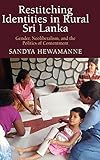Restitching Identities in Rural Sri Lanka : Gender, Neoliberalism, and the Politics of Contentment / Sandya Hewamanne.
Material type: TextSeries: Contemporary EthnographyPublisher: Philadelphia : University of Pennsylvania Press, [2020]Copyright date: ©2020Description: 1 online resource (224 p.)Content type:
TextSeries: Contemporary EthnographyPublisher: Philadelphia : University of Pennsylvania Press, [2020]Copyright date: ©2020Description: 1 online resource (224 p.)Content type: - 9780812252408
- 9780812297331
- Free trade -- Sri Lanka
- Neoliberalism -- Social aspects -- Sri Lanka
- Return migrants -- Sri Lanka
- Sex role -- Sri Lanka
- Women migrant labor -- Sri Lanka
- Women -- Identity
- Women -- Sri Lanka -- Economic conditions
- Women -- Sri Lanka -- Social conditions
- Anthropology
- SOCIAL SCIENCE / Anthropology / Cultural & Social
- Anthropology
- Folklore
- Linguistics
- 331.4 23
- HD5856.S72
- online - DeGruyter
| Item type | Current library | Call number | URL | Status | Notes | Barcode | |
|---|---|---|---|---|---|---|---|
 eBook
eBook
|
Biblioteca "Angelicum" Pont. Univ. S.Tommaso d'Aquino Nuvola online | online - DeGruyter (Browse shelf(Opens below)) | Online access | Not for loan (Accesso limitato) | Accesso per gli utenti autorizzati / Access for authorized users | (dgr)9780812297331 |
Frontmatter -- CONTENTS -- Chapter 1. Global in the Villages: Politics of Contentment -- Chapter 2. Pure Girls! Don’t Open the Door -- Chapter 3. Industrious and Obedient Daughters- in- Law -- Chapter 4. Superwomen and Lazy Lalies: Villages Adjusting to Successful Former Workers -- Chapter 5. Sex in the Village: Subversive Sexualities Abandoned? -- Chapter 6. The Strange, the Crazy, and the Stubborn -- Chapter 7. I Do Not Want to Be Rich and Lonely: Politics of Contentment -- Conclusion -- Notes -- Bibliography -- Index -- Acknowledgments
restricted access online access with authorization star
http://purl.org/coar/access_right/c_16ec
Sandya Hewamanne's Stitching Identities in a Free Trade Zone analyzed how female factory workers in Sri Lanka's free trade zones challenged conventional notions about marginalized women at the bottom of the global economy. In Restitching Identities in Rural Sri Lanka Hewamanne now follows many of these same women to explore the ways in which they negotiate their social and economic lives once back in their home villages. Drawing on ethnographic fieldwork conducted over fifteen years, the book explores how the former free-trade-zone workers manipulate varied forms of capital—social, cultural, and monetary— to become local entrepreneurs and community leaders, while simultaneously initiating gradual changes in rural social hierarchies and gender norms.Free trade zones introduce Sri Lankan women to neoliberal ways of fashioning selves, Hewamanne contends. Her book illustrates how varied manifestations of neoliberal attitudes within local contexts result in new articulations of what it is to be an entrepreneur as well as a good woman. By focusing on how former workers decenter neoliberal market relations while using their entrepreneurial and civic activities to reimagine social life in ways more satisfying to them and their loved ones—what the author calls a politics of contentment—the book sheds light on new political possibilities in contexts where both reproduction of neoliberal economic relations and implementation of alternatives co-exist.
Mode of access: Internet via World Wide Web.
In English.
Description based on online resource; title from PDF title page (publisher's Web site, viewed 27. Jan 2023)


